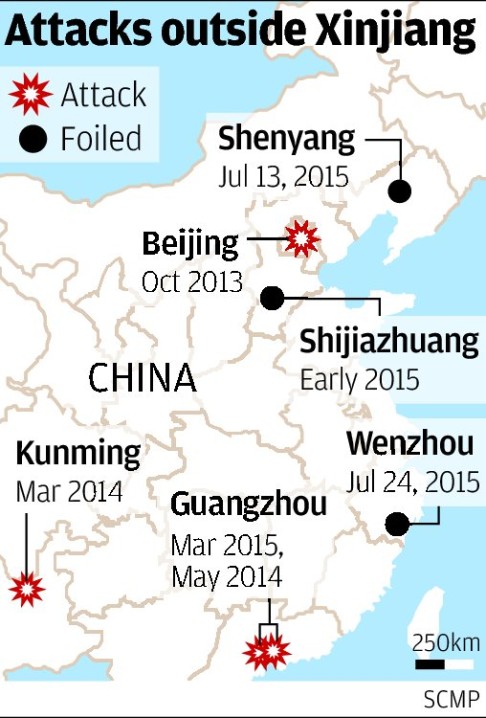
Chinese police catch two terror suspects, seize explosives and knives after tip-off
Pair held, explosives and knives seized after tip-off leads to pre-dawn raid
Mainland police on Friday caught two terror suspects in a pre-dawn crackdown on an alleged terrorist group based in Wenzhou in the eastern Zhejiang province.
The pair were captured around 5am after police received a tip-off about a group plotting terrorist activities in the region, the municipal press office said.
Officers seized explosives, knives and other weapons and were investigating the case, the office said on Weibo. It did not give details about the suspects' ethnicity, their plots or the number of people involved.
This marks the mainland's second such case in two weeks.
On July 13, police from the northeastern Liaoning province said they shot dead three terror suspects and caught a fourth in Shenyang. Over 200 armed officers were deployed to subdue the four, from Xinjiang , who were brandishing long knives and chanting jihadist slogans, police said.
On Monday, state television revealed that police from the northern Hebei province earlier this year foiled a terrorist plot to bomb a Shijiazhuang shopping mall, airing a lengthy confession by a terror suspect from Xinjiang.
Beijing says some of Xinjiang's ethnic Uygur minority have fled the country to join terrorist groups abroad.

"I am surprised that within such a short period of time, we have seen [counterterrorism operations] in places nobody really thought would be the targets of terrorist attacks. Places obscure, at least to foreigners," said Barry Sautman, a political scientist from the Hong Kong University of Science and Technology who studies China's ethnic policies.
Sautman said the recent cases indicated that those who were planning to carry out terrorist activities had shifted their attention to cities that were currently off the radar of the country's counterterrorism forces.
"When the authorities step up vigilance in the hot places for terrorist attacks, it is common for the [terror] groups to move elsewhere," he said.
Raffaello Pantucci, from Britain's Royal United Services Institute for Defence and Security Studies, said: "The cases seem to show a threat that is spreading, but … information is quite patchy and it is not always clear whether these have all been centrally directed or if it is sporadic, random anger bubbling up."
Li Wei, director of the China Institutes of Contemporary International Relations' counterterrorism research centre, said the cases showed that separatists and religious extremists were exploring new routes to flee abroad for terrorist training.
"The authorities in Yunnan , Guangxi , and Guangdong provinces, which border Southeast Asian countries, have stepped up security," Li said. "That is why we are seeing reports of interdicted terrorist attacks in other provinces."

